Conference
Gender Studies meets Jineolojî II – Nature, Body and Gender: Re-Actualizations
18.02.2022
10 am – 6 pm (CET)
(Zoom)
There will be German – English simultaneous translation.
Programme
Welcome:
Dersim Dagdeviren, Co-Chair of Network of Kurdish Academics
Dr. Beate von Miquel, Managing Director of the Marie Jahoda Center for International Gender Studies of the Ruhr-Universität Bochum
Introduction:
Dr. Muriel González Athenas, Ruhr-Universität Bochum
Panel I: Reconstituting science through decolonial practice
Dr. Azize Aslan, National Autonomous University of Mexico (UNAM)
Restoring female subjectivity in the organisation of life and Jineolojî as a perspective of autonomy
Yuderkys Espinosa Miñoso, Instituto Caribeño de Pensamiento e Investigación Descolonial/GLEFAS und CAPAS/University of Heidelberg
La crítica a la colonialidad de la razón feminista (The Critique of Coloniality from the Perspective of Feminist Reason)
Moderation: Dr. Mechthild Exo, Emden/Leer University of Applied Sciences
Panel II: Body, Materiality and Nature
Lisa Krall, University of Cologne
Relations and entanglements. Feminist-materialist reading of epigenetic studies
Elif Berk, Jineolojî magazine, Kurdistan
From the war of concepts to life itself
Klee Ritter, Queer Studies, University of Cologne
Queer feminism as part of the women’s revolution
Moderation: Dr. Christine Löw, Georg-August-Universität Göttingen
Panel III: Ecology and population policies – finding ways and avoiding pitfalls
PD Dr. Susanne Schultz, University of Frankfurt a.M.
Anti-Malthusianism in Times of Climate Change: The Reproductive Justice Perspective
Prof. Dr. Daniela Danna, University Salento, Italy
Capitalism, Population and the Role of Women
Sarah Marcha, Jineolojî Center Brussels, Belgium
Overcoming the ecological and population problems by strengthening the identity of free women and democratic civilisation
Moderation: Dr. Muriel González Athenas, Ruhr-Universität Bochum
A cooperation event of the Marie Jahoda Center for International Gender Studies of the Ruhr-Universität Bochum, the Emden/Leer University of Applied Sciences and the Network of Kurdish Academics
Supported by Rosa Luxemburg Foundation

Please register via info@kurd-akad.com by 15.02.2022.
…
The topic
The reference to “nature” is a fundamental point of contention in various currents of feminist theories. With the recent “material turn”, there is a renewed engagement with material aspects of gender, bodies and nature, as well as with notions of exploitation, domination and capitalism. Currently, feminist-ecological considerations are being discussed more strongly again, as are materialist as well as neo-Marxist feminisms.
For some years now, a new form of science has also been emerging out of the Kurdish (women’s) movement, the Jineolojî, which traces how a free, communal way of life, integrated into nature, has been lost in the 5,000 years of history of patriarchy. The Jîneolojî strives to understand people as part of nature and to see the struggle for its preservation as an important aspect of democratic confederalism.
In the face of global crises of climate, poverty, care and social reproduction, violent conflicts and feminicides, debates on materiality and nature relations are once again coming into the focus of feminist resistances, practices and theorisations. The global indigenous, communal, rural struggles of women in the global South with the aim of decolonising world and knowledge relations are also receiving more attention. Thus, marginalised women and non-hegemonic feminist struggles for a self-determined way of life interwoven with the defence of nature or the environment are also receiving increased attention.
With the conference we want to create a space to understand, discuss and connect reflections on the links between patriarchy, capitalism and environmental degradation, between society and nature, between women and nature, between gender relations and ecology from the perspective of gender studies/feminist theory and the perspective of Jineolojî.
Coordinators: Dr. Muriel González Athenas (Ruhr-Universität Bochum); Dr. Mechthild Exo (Emden/Leer University of Applied Sciences); Dersim Dagdeviren, Co-Chair of Network of Kurdish Academics; Münevver Azizoglu-Bazan (PhD student, University of Bremen), Dr. Christine Löw (Georg-August-Universität Göttingen)

